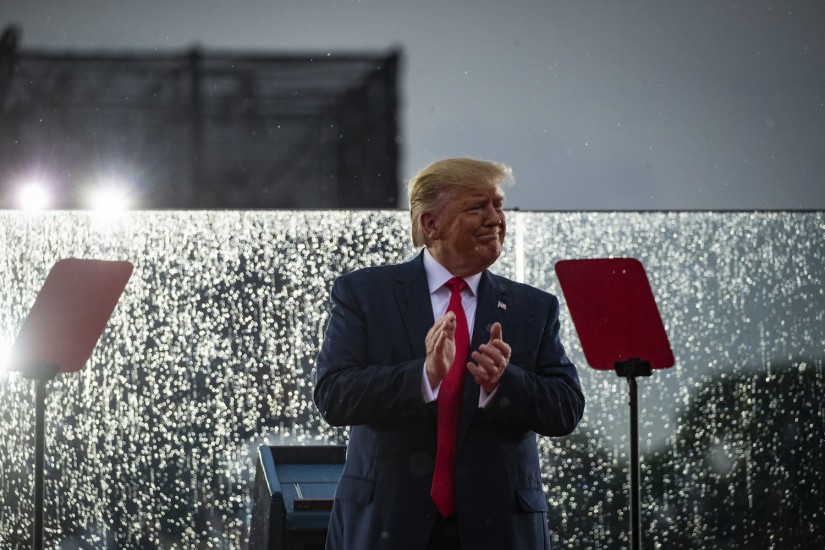Last week, President Trump unintentionally spawned a new form of entertainment when he recalled the glories of the Continental Army during the War for Independence in his “Salute to America” event on July 4. These brave Americans “manned the air.” They “rammed the ramparts.” And above all, the Continental Army “took over the airports.”
On social media, memes proliferated: George Washington in a “Top Gun” flight suit, skirmishes at baggage claim and a fight outside the Cinnabon stall. Even Rolling Stones frontman Mick Jagger got in a dig during a concert, quipping, “If only the British had held on to the airports, the whole thing might have gone very differently for us.” To his critics, the moment was yet another example of Trump’s breathtaking ignorance and incoherence. His supporters either dismissed his nonsensical comments as a technical glitch with the teleprompter (as he did), or they simply didn’t care.
But while everyone took note of Trump’s airport gaffe (of course there were no airports in the 18th century), they failed to reckon with the deeper problems in Trump’s narrative of the Revolutionary War. Triumphalist and militaristic, Trump’s speech told the tale of Americans beating overwhelming odds to secure their liberties by single-handedly defeating a global superpower. His rendering had a clear implication: The United States is at its best when it goes it alone.
This story of our national origin is no less absurd than images of Continental soldiers storming Dulles International Airport. The United States won the Revolutionary War with more than a little help from its friends. Victory would have been impossible without financial and military aid from France, Spain, Russia, Denmark, Norway, Sweden, the Netherlands, Prussia, Austria, Portugal, parts of Italy and the Ottoman Empire. The war began as a colonial rebellion, but it quickly escalated into a global conflict in which the United States and Great Britain were merely two of many belligerents.
France was America’s most important ally. Eager for revenge after a humiliating defeat at the hands of the British in the French and Indian War (1754-1763), King Louis XVI recognized American independence in 1778. French financial support, along with loans from the Dutch and other Europeans, helped to keep Washington’s army in the field. Warfare was an expensive business, and with no power of taxation, Congress relied on foreign loans to buy the arms, ammunition and supplies necessary to maintain the struggle for independence.
However, the role of America’s allies went beyond offering supplies and monetary support. Trump’s July 4 speech invoked Washington’s victory at Yorktown as a shining example of what Americans could achieve on their own. But he was unwittingly citing a clear example of the global nature of the conflict.
France wasn’t the British Empire’s only rival itching for revenge. The war provided Spain an opportunity to hit Britain where it hurt by threatening to capture its valuable Caribbean sugar colonies while the redcoats had their hands full fighting the Continental Army. Under Russian leadership, other European powers formed the League of Armed Neutrality to protect merchant ships from the British navy, as the British tried to strangle the fight for American independence.
After French entry into the war in 1778, Britain refocused its attention on protecting its sugar colonies, which were worth much more to its economy than the 13 rebellious provinces on the mainland. The outbreak of war with Spain in 1779 and the Netherlands in 1780, which both possessed Caribbean colonies, only increased the strategic importance of the Caribbean — the center of European imperialism in the 18th century — for the British.
Victory at Yorktown depended on events in the Caribbean. Distracted by plundering the Dutch colony of St. Eustatius, British Adm. George Rodney allowed the French fleet to escape from the Caribbean and blockade Yorktown, where it played a pivotal role in forcing the surrender of British Gen. Charles Cornwallis in 1781.
Yorktown wasn’t exceptional. Throughout the war, the various strands of global conflict were interconnected, and America’s fate hung in the balance as the British battled other enemies. Though Yorktown marked the end of offensive British operations on American soil, the war continued for another year because Britain, France and Spain still had scores to settle in the Caribbean and the Mediterranean. King George III’s official recognition of American independence with the 1783 Treaty of Paris only happened once France and Spain agreed to make peace.
Although these stories are often overlooked during annual July 4 celebrations in the 21st century, previous generations knew foreign allies were as central to winning independence as the valor of the troops or the brilliance of Washington. When the Marquis de Lafayette died in 1834, the nation went into mourning for a Revolutionary War hero and an icon of America’s foreign allies.
America didn’t win independence by beating the odds. The Founding Fathers understood they were at a disadvantage against the mighty British Empire. So they shrewdly changed the odds in their favor by forging alliances with foreign powers and adapting their military strategies to fit the global nature of war. It does nothing to diminish the heroism of Washington and the Continental Army to recognize that they were smart and adaptable as well as brave.
Trump got it wrong when he suggested that the Continental Army protected airports. His more dangerous mistake was valorizing a go-it-alone foreign policy. The American War of Independence was far from a solitary quest. It was instead the ultimate repudiation of “America First” — a tale of allies working together and being better off for it.
